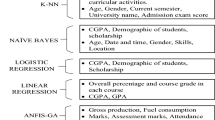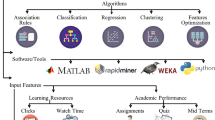Abstract
The academic performance of a student in a university is determined by a number of factors, both academic and non-academic. Student that previously excelled at the secondary school level may lose focus due to peer pressure and social lifestyle while those who previously struggled due to family distractions may be able to focus away from home, and as a result excel at the university. University admission in Nigeria is typically based on cognitive entry characteristics of a student which is mostly academic, and may not necessarily translate to excellence once in the university. In this study, the relationship between the cognitive admission entry requirements and the academic performance of students in their first year, using their CGPA and class of degree was examined using six data mining algorithms in KNIME and Orange platforms. Maximum accuracies of 50.23% and 51.9% respectively were observed, and the results were verified using regression models, with R2 values of 0.207 and 0.232 recorded which indicate that students’ performance in their first year is not fully explained by cognitive entry requirements.










Similar content being viewed by others
Explore related subjects
Discover the latest articles, news and stories from top researchers in related subjects.References
Adeogun, A., Subair, S., & Osifila, G. (2009). Deregulation of university education in Nigeria: Problems and prospects. Florida Journal of Educational Administration & Policy, 3, 1–8.
Adeyemi, K. (2001). Equality of access and catchment area factor in university admissions in Nigeria. Higher Education, 42, 307–332.
Agarwal, S., Pandey, G., & Tiwari, M. (2012). Data mining in education: Data classification and decision tree approach. International Journal of e-Education, e-Business, e-Management and e-Learning, 2, 140.
Ahmed, A. B. E. D., & Elaraby, I. S. (2014). Data mining: A prediction for Student's performance using classification method. World Journal of Computer Application and Technology, 2, 43–47.
Ahuja, R. & Kankane, Y. (2018). Predicting the probability of student's degree completion by using different data mining techniques. 474–477.
Ahuja, R., Jha, A., Maurya, R. & Srivastava, R. (2019). Analysis of educational data mining. 4th International Conference on Harmony Search, Soft Computing and Applications, ICHSA 2018, Gurgaon; India. Advances in Intelligent Systems and Computing, 897–907.
Aina, O. I. 2002. Alternative modes of financing higher education in Nigeria and the implications for university governance. Africa Development/Afrique et Développement, 236–262.
Ajadi, T. O., Salawu, I. O. & Adeoye, F. A. (2008). E-learning and distance education in Nigeria. Online Submission, 7.
Ajayi, I., & Ekundayo, H. T. (2008). The deregulation of university education in Nigeria: Implications for quality assurance. Nebula, 5, 212–224.
Almarabeh, H. (2017). Analysis of Students' performance by using different data mining classifiers. International Journal of Modern Education and Computer Science, 9, 9.
Aluede, O., Idogho, P. O. & Imonikhe, J. S. (2012). Increasing access to university education in Nigeria: Present challenges and suggestions for the future. The African Symposium. 3–13.
Angeli, C., Howard, S. K., Ma, J., Yang, J., & Kirschner, P. A. (2017). Data mining in educational technology classroom research: Can it make a contribution? Computers and Education, 113, 226–242.
Arsad, P. M. & Buniyamin, N. (2014). Neural Network and Linear Regression methods for prediction of students' academic achievement. Global Engineering Education Conference (EDUCON), IEEE, 2014. IEEE, 916–921.
Atta UR, R., Sultan, K., Aldhafferi, N., & Alqahtani, A. (2018). Educational data mining for enhanced teaching and learning. Journal of Theoretical and Applied Information Technology, 96, 4417–4427.
Azevedo, A. (2018). Data mining and knowledge discovery in databases. In Encyclopedia of information science and technology, fourth edition. IGI Global.
Babalola, J. B. (1998). Cost and financing of university education in Nigeria. Higher Education, 36, 43–66.
Baepler, P., & Murdoch, C. J. (2010). Academic analytics and data mining in higher education. International Journal for the Scholarship of Teaching and Learning, 4, 17.
Bharara, S., Sabitha, S., & Bansal, A. (2018). Application of learning analytics using clustering data Mining for Students’ disposition analysis. Education and Information Technologies, 23, 957–984.
Bhise, R., Thorat, S., & Supekar, A. (2013). Importance of data mining in higher education system. IOSR Journal Of Humanities And Social Science (IOSR-JHSS), 6, 18.
Bucos, M., & Drăgulescu, B. (2018). Predicting student success using data generated in traditional educational environments. TEM Journal, 7, 617–625.
Burgos, C., Campanario, M. L., Peña, D. D. L., Lara, J. A., Lizcano, D., & Martínez, M. A. (2018). Data mining for modeling students’ performance: A tutoring action plan to prevent academic dropout. Computers and Electrical Engineering, 66, 541–556.
Burke, A. S., & Fedorek, B. (2017). Does “flipping” promote engagement?: A comparison of a traditional, online, and flipped class. Active Learning in Higher Education, 18, 11–24.
Daradoumis, T., Marquès Puig, J. M., Arguedas, M., & Calvet Liñan, L. (2019). Analyzing students’ perceptions to improve the design of an automated assessment tool in online distributed programming. Computers and Education, 128, 159–170.
Ebbeler, J. (2013). Introduction to ancient Rome,' the flipped version. The Chronicle of Higher Education [online], 59. Available: https://www.chronicle.com/article/Introduction-to-Ancient/140475/.
Fernandes, E., Holanda, M., Victorino, M., Borges, V., Carvalho, R., & Erven, G. V. (2019). Educational data mining: Predictive analysis of academic performance of public school students in the capital of Brazil. Journal of Business Research, 94, 335–343.
Hussain, S., Dahan, N. A., Ba-Alwib, F. M., & Ribata, N. (2018). Educational data mining and analysis of students’ academic performance using WEKA. Indonesian Journal of Electrical Engineering and Computer Science, 9, 447–459.
Hussain, S., Atallah, R., Kamsin, A. & Hazarika, J. (2019). Classification, clustering and association rule mining in educational datasets using data mining tools: A case study.
Ibrahim, Z. M., Bader-El-Den, M. & Cocea, M. (2019). Mining unit feedback to explore students’ learning experiences. Advances in Intelligent Systems and Computing.
Idachaba, F. (2018a). Development of a rapid mentoring scheme for managing large classes in engineering departments. INTED2018 Conference, 5th–7th March 2018 2018a Valencia, Spain. 5725–5731.
Idachaba, F. (2018b). Outcome based engineering curriculum design: a system for curriculum streamlining and graduate quality improvement in engineering. INTED2018 Conference, 5th–7th March 2018 2018b Valencia, Spain. 5888–5893.
Kaur, N., & Kaur, J. (2018). Performance evaluation of data mining classification in educational system using genetic algorithm. International Journal of Advanced Science and Technology, 114, 127–138.
Khan, A., & Ghosh, S. K. (2018). Data mining based analysis to explore the effect of teaching on student performance. Education and Information Technologies, 23, 1677–1697.
Khedr, A. E., & El Seddawy, A. I. (2015). A proposed data mining framework for higher education system. International Journal of Computer Applications, 113, 24–31.
Kim, D., Yoon, M., Jo, I. H., & Branch, R. M. (2018). Learning analytics to support self-regulated learning in asynchronous online courses: A case study at a women's university in South Korea. Computers and Education, 127, 233–251.
Kostopoulos, G., Kotsiantis, S., Pierrakeas, C., Koutsonikos, G., & Gravvanis, G. A. (2018). Forecasting students' success in an open university. International Journal of Learning Technology, 13, 26–43.
Kurt, G. (2017). Implementing the flipped classroom in teacher education: Evidence from Turkey. Educational Technology and Society, 20, 211–221.
Lynch, C. F. (2017). Who prophets from big data in education? New insights and new challenges. Theory and Research in Education, 15, 249–271.
Nikolic, S. & Nicholls, B. (2018). Exploring student interest of online peer assisted learning using mixed-reality technology.
Nurhayati, O. D., Bachri, O. S., Supriyanto, A., & Hasbullah, M. (2018). Graduation prediction system using artificial neural network. International Journal of Mechanical Engineering and Technology, 9, 1051–1057.
Odukoya, J. A., Popoola, S. I., Atayero, A. A., Omole, D. O., Badejo, J. A., John, T. M., & Olowo, O. O. (2018). Learning analytics: Dataset for empirical evaluation of entry requirements into engineering undergraduate programs in a Nigerian university. Data in Brief, 17, 998–1014.
Oguntunde, P., Okagbue, H., Oguntunde, O. A., & Opanuga, A. (2018). Analysis of the inter-relationship between students’ first year results and their final graduating grades. International Journal of Advanced and Applied Sciences, 5, 1–6.
Olsson, M. & Mozelius, P. (2016). On design of online learning environments for programming education. Proceedings of the European Conference on e-Learning, ECEL. 533–539.
Osmanbegović, E. & Suljic, M. (2012). Data mining approach for predicting student performance.
Popoola, S. I., Atayero, A. A., Badejo, J. A., Odukoya, J. A., Omole, D. O., & Ajayi, P. (2018). Datasets on demographic trends in enrollment into undergraduate engineering programs at Covenant University, Nigeria. Data in Brief, 18, 47–59.
Rodrigues, M. W., Isotani, S., & Zárate, L. E. (2018). Educational data mining: A review of evaluation process in the e-learning. Telematics and Informatics, 35, 1701–1717.
Roy, S. & Garg, A. (2018). Predicting academic performance of student using classification techniques. 2017 4th IEEE Uttar Pradesh section international conference on electrical, computer and electronics, UPCON 2017. 568–572.
Ryan, S. J. D., & Baker. (2010). Data mining for education. International encyclopedia of education, 7, 112–118.
Saint, W., Hartnett, T. A., & Strassner, E. (2003). Higher education in Nigeria: A status report. Higher Education Policy, 16, 259–281.
Senthil, S. & Lin, W. M. (2018). Applying classification techniques to predict students' academic results. 2017 IEEE International Conference on Current Trends in Advanced Computing, ICCTAC 2017. 1–6.
Sivakumar, S. & Selvaraj, R. 2018. Predictive modeling of students performance through the enhanced decision tree. Lecture Notes in Electrical Engineering.
Tair, M. M. A., & El-Halees, A. M. (2012). Mining educational data to improve students' performance: A case study. International Journal of Information and Communication Technology Research, 2, 140–146.
Van WYK, M. M. (2018). Economics student teachers’ views on the usefulness of a flipped classroom pedagogical approach for an open distance eLearning environment. International Journal of Information and Learning Technology, 35, 255–265.
Yadav, S. K., Bharadwaj, B. & PAL, S. (2012). Mining education data to predict student's retention: A comparative study. arXiv preprint arXiv:1203.2987.
Acknowledgements
The Authors appreciate Covenant University Centre for Research, Innovation and Development for the commitment to innovative research, and for providing an enabling research environment.
Author information
Authors and Affiliations
Corresponding author
Additional information
Publisher’s Note
Springer Nature remains neutral with regard to jurisdictional claims in published maps and institutional affiliations.
Rights and permissions
About this article
Cite this article
Adekitan, A.I., Noma-Osaghae, E. Data mining approach to predicting the performance of first year student in a university using the admission requirements. Educ Inf Technol 24, 1527–1543 (2019). https://doi.org/10.1007/s10639-018-9839-7
Received:
Accepted:
Published:
Issue Date:
DOI: https://doi.org/10.1007/s10639-018-9839-7




